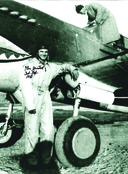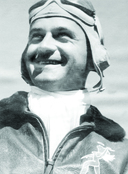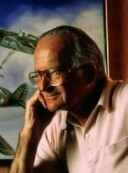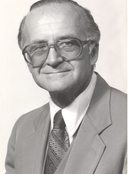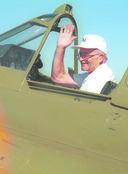Memorial Candle Tribute From
Anderson's Tribute Center
"We are honored to provide this Book of Memories to the family."
View full message >>>
Obituary for Ken Jernstedt
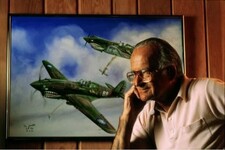
Kenneth Allen Jernstedt, who lived his adult life in Hood River, died Feb. 5, 2013 of age-related causes at 95. Ken was born July 20, 1917 to Fred and Mae Jernstedt in Carlton, where he spent his childhood years on a farm on the Yamhill River, graduating from Yamhill High School in 1935. He fondly recounted throughout his life the happy youthful years of family and farm life, shared among his siblings Don, Ruth and Rex.
After graduating from Linfield College in 1939, where during his senior year he met his future wife Laura Elliott of Boring, he enlisted with the Marine Air Corps where he gained his aviator’s wings in 1941. He subsequently volunteered with two other marine buddies from flight school for the American Volunteer Group, personally authorized by President Roosevelt and led by retired Air Force General Claire Chennault, where he was a squadron leader with the original Flying Tigers, fighting primarily over the Burma Road to assist China in resisting the Japanese invasion. He was Oregon’s first ace in World War II.
After the AVG disbanded in the summer of 1942, he served as an experimental test pilot for Republic Aviation in Long Island, New York, when he married his college sweetheart, Laura Elliott. In 1946, the young family returned to Oregon with their son to settle in Hood River, where they added three daughters to their household, and Ken entered the soft drink business, operating Mid-Columbia Coca-Cola until 1968.
After Larry’s death in 1960, Ken married Genevieve Weder Carl in 1962 and became the father also of her three young children. Ken first served as mayor of Hood River in 1959, followed by service in the Oregon House and the Oregon Senate from 1966 to his retirement in 1989. He was again elected mayor of Hood River in 1989. He was active as a lay leader in the Hood River Valley Christian Church, serving as an elder, deacon and Chairman of the Board until later years when health intervened.
For more than 65 years Ken was a proud resident of the Hood River Valley. He fondly recalled joining other locals in 1948 in shoveling snow from the football field the morning of an important late season football game. He recounted how some folks took advantage of the monster winter of 1950 to drive their cars across the ice on the Columbia to White Salmon. For many seasons he was part of the chain gang on the sidelines of high school football games, and he was an enthusiastic chauffer of daughters and friends to cheer and participate at away games, track meets and swim events. He often participated in local service projects of the Hood River Lions Club. He was always eager to take a small bet with local graduates of Willamette University in football and basketball contests with his Mighty Wildcats of Linfield.
In retirement, Ken enjoyed starting each week day downtown in the company of a regular group of both new and seasoned “locals” for 90 minutes of coffee talk to solve the world’s problems. For 10 of his retirement years, his walking companion was his faithful guide dog Driscoll. He also served as a member of the Oregon Commission for the Blind, although he was able to read the news and favored magazines daily until very recent years.
Ken was predeceased by his siblings, his daughter Kristin (Steve of Cashmere, Wash.) Crossland, son-in-law Bruce Mason, daughter-in-law Sandra Reece Jernstedt, and grandson Brandon Frigaard. He is survived by his wife of 50 years, Gen; sons Ken (Jill) Jernstedt of Lake Oswego and Jeff (Ann) Jernstedt of Bend; daughters Sybil (Bob) Ford of Springfield, Greta (Keith) Sheppard of West Linn, Meredith (Kent) Frigaard of Wilsonville and Laurie Mason of Vancouver. He was proud of 22 grandchildren: Ian (Wendy), Ben, Nicole (fiancé Cam Clennon) and Spencer Crossland, Erik, Matthew and Kaitlin Jernstedt, Seth, Joel (Shannon) and Paige Ford; Audrey (Jeremy) Forrest and Mark Sheppard (fiancée Amy Keyser); Alec (fiancée Kelly Cianciotta) and Gretchen Jernstedt; Martin, Kegan and Griffin Frigaard; Michelle Jernstedt, Courtney and Cody Mason; and eight great-grandchildren.
The family extends special recognition and appreciation for the wonderful care Dad was provided over the last five years at Parkhurst House of Hood River and The Springs at Wilsonville senior living community, supported lovingly in recent months by the angels of Serenity Hospice, Portland.
A Memorial Service will be held at 2 p.m. on Saturday, Feb. 16 at the Hood River Valley Christian Church with a church reception to follow. The family suggests that in lieu of flowers, a memorial contribution be considered to Hood River Valley Christian Church, WAAAM in Hood River), or a charity of choice.
The family also appreciates the thoughtful assistance in memorial arrangements of the generous people at Anderson Tribute Center and Pastors Dave and Linda Presley at HR Valley Christian Church.
In 1941, Ken Jernstedt was a 24 tear-old U.S. Marine Air Corps fighter pilot in Florida diving on targets in Guantanamo Bay. These targets didn’t shoot back. It was a time when the United States had isolated itself from the world’s conflicts and wars.
So, why would Jernstedt resign his officer’s commission and sign a one-year contract that would take him to China as an employee of the Central Aircraft Manufacturing Company?
“They offered us three times the money we were making and an opportunity to travel to a part of the world I’d never seen,” Jernstedt recalled. Joining a large group of other American Volunteer Group (AVG) “employees” he sailed by way of San Francisco, Hong Kong and Singapore and arrived by ship in June 1941 in Rangoon, Burma. He and AVG pilots Chuck Older and Tom Haywood were the first to reach their assignment in September.
“It’d be a CIA job today,” he said.
The AVG was a 100 aircraft private air force formed with the covert approval of President Roosevelt and then hired by Chinese leader Chiang Kai-shek. Jernstedt and nearly 90 other pilots, about 250 ground crewmen, administrative personnel and others were hired by China to fight the Japanese.
He was assigned to the AVG’s 3rd Squadron, “Hells Angels.” Upon their arrival and for three months, their commander, Brig. Gen. Claire Chennault, put his Tigers through intense training to learn to fly and fight with their P-40 Tomahawks.
The P-40 sported a familiar snarling tiger-like teeth emblem painted around the engine cowling. It was hard to start and had barely been proved worthy in air combat in Europe. With a top speed of nearly 360 miles per hour, it was faster than the more maneuverable Japanese fighters.
The only man considered by Chiang Kai-shek to lead the AVG, Chennault taught his pilots was to dive on the bombers, shoot and then leave quickly. “It was hit and run and it was a sound tactic.”
The AVG patrolled an area in China/Burma that stretched from Kunming to Rangoon, or the distance between Portland and San Diego. Jernstedt said there was plenty of luck in flying a mission, like when he spotted 15 enemy bombers. He decided to “make a run at them by myself.” During one pass, a bullet broke the windshield, whizzed by his head and slammed into the armor plate behind him. With glass in his left eye, Jernstedt said he was “lucky enough to land the plane.”
As the Tigers shot down raiding bombers and destroyed aircraft on Japanese airfields, their paychecks reflected their work.
During one memorable mission Jernstedt recalled that he and another 3rd Squadron pilot, Bill Read, flew to Mulmein near Mataban Bay. The early morning sunlight revealed enemy planes lined up and parked wing tip to wing tip.
“We made six strafing passes and destroyed 15 airplanes. Bill and I split the $7,500 payment between us. We made between $550 to $750 per month and received $500 for every enemy plane we shot down.”
A list of military luminaries Jernstedt crossed paths with included Charles A. Lindbergh, Greg “Pappy” Boyington, later the commander of the Navy’s “Black Sheep Squadron,” Col. Jimmy Doolittle, the commander of the 1942 American air raid on Tokyo, Generalissimo and Madame Chiang Kai-shek.
“Greg was a fun guy; a hard nosed Marine and a good pilot, but he drank too much. He didn’t like taking orders from younger men senior to him. He once made a disparaging remark to Madame Chiang and some of her entourage at a party in our honor. The next day he was gone and may have been fired.”
By the time the group had been disbanded they had destroyed 286 planes and lost on 23. Jernstedt had 10.5 aerial kills (“I didn’t get paid for 2 others.”), and became Oregon’s first air war ace.
He returned to Oregon in the summer of 1942 and was then heavily recruited by the Air Corps, Navy and Marines to return to flying. But, Jernstedt’s friend and former Flying Tiger Parker DuPuoy was a test pilot for Republic Aviation in Long Island, New York. He took the job.
During Jernstedt’s two years as a test pilot he flew nearly every fighter plane of that era, including his favorite--the rugged P-47. His encounter with “Lindy” was at Grumman Aviation in N.J. Jernstedt was first in line to test fly the Navy’s new Hellcat, but he insisted that Lindbergh go first.
“When he returned, his landing gear wouldn’t come down. Lindy put her into a steep dive and pulled up quickly so the force of gravity could drop the gear into place,” Jernstedt recalled. “On his third try, the gear came down and he landed. When he got out of the plane I joked with him and said, ‘Hey Lindy, thanks for checking that one out for me.’ He was a real gentleman.”
With his roots embedded in his home state, he settled in Hood River. Jernstedt ran a successful Coca-Cola bottling plant and began a political career that lasted 40 years. He was elected to the Oregon House of Representatives in 1966 and then served five terms in the Oregon Senate.
The city of Hood River would soon elect the mild mannered Jernstedt to a second mayoral term in 1989. He retired from politics in 1991. Due to glaucoma, his vision eventually deteriorated, yet he still remains active attending selected events.
The Department of Defense in December 1996 recognized Jernstedt and 16 other surviving AVG pilots by awarding them the Distinguished Flying Cross. In June 2001, the Port of Hood River formally changed the name of the local airport to Ken Jernstedt Airport in his honor.
Throughout the years, and into his nineties, Jernstedt has kept his wartime life low key. World War II history buffs, admirers and fans of the Flying Tigers have continually sought him out for autographs and interviews.
“I’ve had such and exciting fun life. It’s been a ball.”
He and his wife Gen have six children, 22 grandchildren and six great-grand children.
After graduating from Linfield College in 1939, where during his senior year he met his future wife Laura Elliott of Boring, he enlisted with the Marine Air Corps where he gained his aviator’s wings in 1941. He subsequently volunteered with two other marine buddies from flight school for the American Volunteer Group, personally authorized by President Roosevelt and led by retired Air Force General Claire Chennault, where he was a squadron leader with the original Flying Tigers, fighting primarily over the Burma Road to assist China in resisting the Japanese invasion. He was Oregon’s first ace in World War II.
After the AVG disbanded in the summer of 1942, he served as an experimental test pilot for Republic Aviation in Long Island, New York, when he married his college sweetheart, Laura Elliott. In 1946, the young family returned to Oregon with their son to settle in Hood River, where they added three daughters to their household, and Ken entered the soft drink business, operating Mid-Columbia Coca-Cola until 1968.
After Larry’s death in 1960, Ken married Genevieve Weder Carl in 1962 and became the father also of her three young children. Ken first served as mayor of Hood River in 1959, followed by service in the Oregon House and the Oregon Senate from 1966 to his retirement in 1989. He was again elected mayor of Hood River in 1989. He was active as a lay leader in the Hood River Valley Christian Church, serving as an elder, deacon and Chairman of the Board until later years when health intervened.
For more than 65 years Ken was a proud resident of the Hood River Valley. He fondly recalled joining other locals in 1948 in shoveling snow from the football field the morning of an important late season football game. He recounted how some folks took advantage of the monster winter of 1950 to drive their cars across the ice on the Columbia to White Salmon. For many seasons he was part of the chain gang on the sidelines of high school football games, and he was an enthusiastic chauffer of daughters and friends to cheer and participate at away games, track meets and swim events. He often participated in local service projects of the Hood River Lions Club. He was always eager to take a small bet with local graduates of Willamette University in football and basketball contests with his Mighty Wildcats of Linfield.
In retirement, Ken enjoyed starting each week day downtown in the company of a regular group of both new and seasoned “locals” for 90 minutes of coffee talk to solve the world’s problems. For 10 of his retirement years, his walking companion was his faithful guide dog Driscoll. He also served as a member of the Oregon Commission for the Blind, although he was able to read the news and favored magazines daily until very recent years.
Ken was predeceased by his siblings, his daughter Kristin (Steve of Cashmere, Wash.) Crossland, son-in-law Bruce Mason, daughter-in-law Sandra Reece Jernstedt, and grandson Brandon Frigaard. He is survived by his wife of 50 years, Gen; sons Ken (Jill) Jernstedt of Lake Oswego and Jeff (Ann) Jernstedt of Bend; daughters Sybil (Bob) Ford of Springfield, Greta (Keith) Sheppard of West Linn, Meredith (Kent) Frigaard of Wilsonville and Laurie Mason of Vancouver. He was proud of 22 grandchildren: Ian (Wendy), Ben, Nicole (fiancé Cam Clennon) and Spencer Crossland, Erik, Matthew and Kaitlin Jernstedt, Seth, Joel (Shannon) and Paige Ford; Audrey (Jeremy) Forrest and Mark Sheppard (fiancée Amy Keyser); Alec (fiancée Kelly Cianciotta) and Gretchen Jernstedt; Martin, Kegan and Griffin Frigaard; Michelle Jernstedt, Courtney and Cody Mason; and eight great-grandchildren.
The family extends special recognition and appreciation for the wonderful care Dad was provided over the last five years at Parkhurst House of Hood River and The Springs at Wilsonville senior living community, supported lovingly in recent months by the angels of Serenity Hospice, Portland.
A Memorial Service will be held at 2 p.m. on Saturday, Feb. 16 at the Hood River Valley Christian Church with a church reception to follow. The family suggests that in lieu of flowers, a memorial contribution be considered to Hood River Valley Christian Church, WAAAM in Hood River
The family also appreciates the thoughtful assistance in memorial arrangements of the generous people at Anderson Tribute Center and Pastors Dave and Linda Presley at HR Valley Christian Church.
In 1941, Ken Jernstedt was a 24 tear-old U.S. Marine Air Corps fighter pilot in Florida diving on targets in Guantanamo Bay. These targets didn’t shoot back. It was a time when the United States had isolated itself from the world’s conflicts and wars.
So, why would Jernstedt resign his officer’s commission and sign a one-year contract that would take him to China as an employee of the Central Aircraft Manufacturing Company?
“They offered us three times the money we were making and an opportunity to travel to a part of the world I’d never seen,” Jernstedt recalled. Joining a large group of other American Volunteer Group (AVG) “employees” he sailed by way of San Francisco, Hong Kong and Singapore and arrived by ship in June 1941 in Rangoon, Burma. He and AVG pilots Chuck Older and Tom Haywood were the first to reach their assignment in September.
“It’d be a CIA job today,” he said.
The AVG was a 100 aircraft private air force formed with the covert approval of President Roosevelt and then hired by Chinese leader Chiang Kai-shek. Jernstedt and nearly 90 other pilots, about 250 ground crewmen, administrative personnel and others were hired by China to fight the Japanese.
He was assigned to the AVG’s 3rd Squadron, “Hells Angels.” Upon their arrival and for three months, their commander, Brig. Gen. Claire Chennault, put his Tigers through intense training to learn to fly and fight with their P-40 Tomahawks.
The P-40 sported a familiar snarling tiger-like teeth emblem painted around the engine cowling. It was hard to start and had barely been proved worthy in air combat in Europe. With a top speed of nearly 360 miles per hour, it was faster than the more maneuverable Japanese fighters.
The only man considered by Chiang Kai-shek to lead the AVG, Chennault taught his pilots was to dive on the bombers, shoot and then leave quickly. “It was hit and run and it was a sound tactic.”
The AVG patrolled an area in China/Burma that stretched from Kunming to Rangoon, or the distance between Portland and San Diego. Jernstedt said there was plenty of luck in flying a mission, like when he spotted 15 enemy bombers. He decided to “make a run at them by myself.” During one pass, a bullet broke the windshield, whizzed by his head and slammed into the armor plate behind him. With glass in his left eye, Jernstedt said he was “lucky enough to land the plane.”
As the Tigers shot down raiding bombers and destroyed aircraft on Japanese airfields, their paychecks reflected their work.
During one memorable mission Jernstedt recalled that he and another 3rd Squadron pilot, Bill Read, flew to Mulmein near Mataban Bay. The early morning sunlight revealed enemy planes lined up and parked wing tip to wing tip.
“We made six strafing passes and destroyed 15 airplanes. Bill and I split the $7,500 payment between us. We made between $550 to $750 per month and received $500 for every enemy plane we shot down.”
A list of military luminaries Jernstedt crossed paths with included Charles A. Lindbergh, Greg “Pappy” Boyington, later the commander of the Navy’s “Black Sheep Squadron,” Col. Jimmy Doolittle, the commander of the 1942 American air raid on Tokyo, Generalissimo and Madame Chiang Kai-shek.
“Greg was a fun guy; a hard nosed Marine and a good pilot, but he drank too much. He didn’t like taking orders from younger men senior to him. He once made a disparaging remark to Madame Chiang and some of her entourage at a party in our honor. The next day he was gone and may have been fired.”
By the time the group had been disbanded they had destroyed 286 planes and lost on 23. Jernstedt had 10.5 aerial kills (“I didn’t get paid for 2 others.”), and became Oregon’s first air war ace.
He returned to Oregon in the summer of 1942 and was then heavily recruited by the Air Corps, Navy and Marines to return to flying. But, Jernstedt’s friend and former Flying Tiger Parker DuPuoy was a test pilot for Republic Aviation in Long Island, New York. He took the job.
During Jernstedt’s two years as a test pilot he flew nearly every fighter plane of that era, including his favorite--the rugged P-47. His encounter with “Lindy” was at Grumman Aviation in N.J. Jernstedt was first in line to test fly the Navy’s new Hellcat, but he insisted that Lindbergh go first.
“When he returned, his landing gear wouldn’t come down. Lindy put her into a steep dive and pulled up quickly so the force of gravity could drop the gear into place,” Jernstedt recalled. “On his third try, the gear came down and he landed. When he got out of the plane I joked with him and said, ‘Hey Lindy, thanks for checking that one out for me.’ He was a real gentleman.”
With his roots embedded in his home state, he settled in Hood River. Jernstedt ran a successful Coca-Cola bottling plant and began a political career that lasted 40 years. He was elected to the Oregon House of Representatives in 1966 and then served five terms in the Oregon Senate.
The city of Hood River would soon elect the mild mannered Jernstedt to a second mayoral term in 1989. He retired from politics in 1991. Due to glaucoma, his vision eventually deteriorated, yet he still remains active attending selected events.
The Department of Defense in December 1996 recognized Jernstedt and 16 other surviving AVG pilots by awarding them the Distinguished Flying Cross. In June 2001, the Port of Hood River formally changed the name of the local airport to Ken Jernstedt Airport in his honor.
Throughout the years, and into his nineties, Jernstedt has kept his wartime life low key. World War II history buffs, admirers and fans of the Flying Tigers have continually sought him out for autographs and interviews.
“I’ve had such and exciting fun life. It’s been a ball.”
He and his wife Gen have six children, 22 grandchildren and six great-grand children.
Order Flowers
Recently Shared Condolences
-
Jan and I are sorry to... (read more)
Recently Lit Candles
-
We are honored to prov ...(read more)
Recently Shared Stories
-
As so many know, Ken w... (read more)
